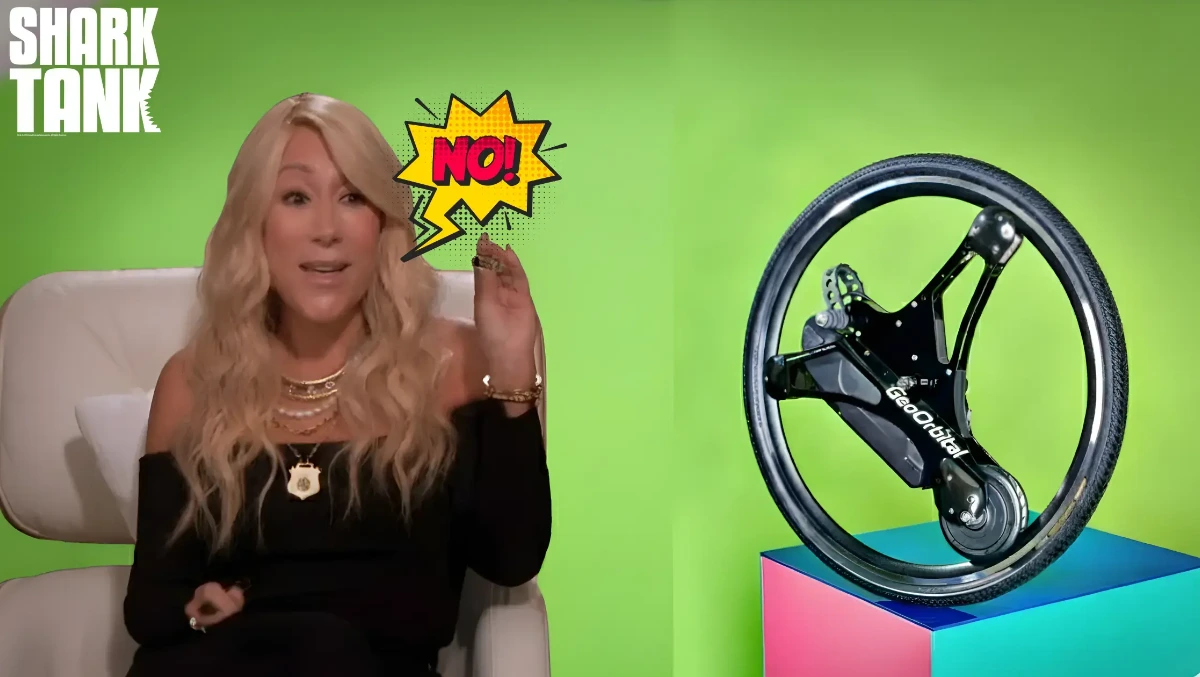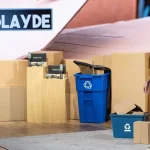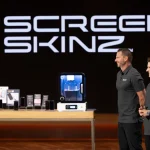
Dakota Decker and Michael Burtov appeared on Shark Tank Season 9 Episode 7 with wheels that could redefine cycling. They had noticed an untapped market in people who wanted to turn their regular bikes into electric ones but didn’t have an easy way to do it. Most bike conversion kits were complicated, technical, hard to install, and far from being beginner-friendly.
That gap inspired them to create a self-installing electric wheel that can turn nearly any standard bike into an e-bike in minutes. The GeoOrbital Wheel used a motor built into the hub to spin three small wheels inside the rim. You could control it with a simple throttle on the handlebars (much like a bike or a scooter).
A full charge can run for 20 miles without any manual human pedaling. This goes up to 50 miles if you help it along. The tire is made from high-density foam, which is puncture-proof.
GeoOrbital Shark Tank Pitch and Recap
Dakota and Michael came in asking for $500,000 for 5% of GeoOrbital. They explained that the idea started in 2014 and grew into a patented design that lets riders swap their bike’s front wheel for an electric one in minutes.
At the time of their pitch, they had already brought in about $200,000 in sales, with each wheel priced at $950. They also mentioned a smaller bike they were developing to work with the same wheel, though it was more of a side project.
Kevin and Barbara jumped up to take a test ride and cruised down the hallway.
Who was in?
Guest Shark Chris Sacca was the first to back out. He said he wasn’t interested in investing in a retrofit-style product and decided to pass.
Mark Cuban followed, saying the price was too steep for him. Kevin O’Leary liked the mini bike idea and even joked that he’d buy one, but he wasn’t ready to invest in the company.
Barbara Corcoran said the same thing; she’d love to have the bike but not as a business deal. It came down to QVC Queen Lori as the product looked like something she might want to dabble with.
To Dakota and Michael’s dismay, she also ended up passing. But before that, Lori imparted the duo with three hyper-specific reasons that made her pass on the product.
Why Lori Said No to GeoOrbital’s Electric Bike Wheel
Lori has never been shy of sharing her pedagogical opinions, which make her take up or pass on a business. She has always employed a three-rule strategy, which enables her to select a product to invest in. The three rules are:
1. Is it something that people need and want?
GeoOrbital’s Electric Bike Wheel met this criterion easily, as the idea of turning any bike into an e-bike had clear appeal.
2. Whether the product solves a real problem
The wheel fit here, too. They offered a simple, retrofit solution for cyclists who wanted electric assistance.
3. Can it be made at an affordable price?
Lori wants products to be affordable for the average consumer, and this is where GeoOrbital fell short. At $950 per wheel, it was too expensive for most people. In spite of its strong concept and practical benefits, it failed to pass Lori’s investment criteria vibe-check.
What Happened To GeoOrbital’s Electric Bike Wheel After Shark Tank?
Even though GeoOrbital didn’t land a deal on Shark Tank, the company kept moving forward. Initially, at least. Their electric wheel made it onto major retail sites like Amazon, Brookstone, and Best Buy. They also raised money through crowdfunding on StartEngine in 2017 and 2018.
Cracks first started to appear in 2018 when the company went through some leadership changes. Their Chief Strategy Officer, Dakota Decker, left to pursue another opportunity.
Despite the shifts in leadership, GeoOrbital earned recognition. Most notable achievements include the Edison Award for Innovation in 2018 and being named one of Time Magazine’s Inventions of the Year in 2019. They even launched a Public Safety division to broaden their business.
It started going downhill after that.
Activity on social media first slowed down, and then the posts stopped popping altogether by November 2019. There have been no Facebook updates since July 2020. By August 2022, their products had disappeared from major retail sites, including their own. Everything points to a classic case of COVID-fueled downfall of a business.
While the company may still exist on paper through the founders’ LinkedIn profiles, the absence of online sales and updates indicates it’s no longer active. It is fairly safe to assume that GeoOrbital has effectively shut down its operations.
Lori’s Rules in Action: When a Great Idea Isn’t Enough
GeoOrbital’s story provides a fresh coat to the age-old narrative paint of why a clever idea and early success aren’t always enough to keep a business going. Lori’s rules make it clear why she passed. A product can be exciting and solve a real problem, but if it’s out of reach for most people, it won’t meet her standards.
The electric wheel spun, generated electricity and captured attention. It won awards and reached retailers, but the challenges of scaling and affordability eventually caught up with the company.
It’s a clear example of how innovation and demand need to be balanced with practicality and accessibility to survive in the long run. It is a formula Lori Greiner knows all too well.




















